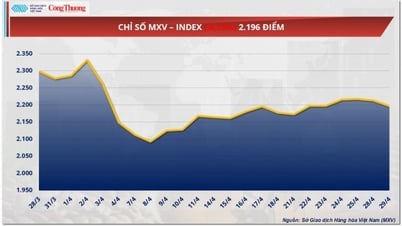In its latest global economic outlook report, the OECD predicts that India, China and Indonesia will lead growth projections for 2023 and 2024. The organization predicts the global economy will grow 2.7% this year, the second-lowest rate since the 2008 global financial crisis, excluding 2020, when the Covid-19 outbreak occurred.
OECD economist Clare Lombardelli said falling energy prices, inflation, supply bottlenecks and the reopening of China's economy, along with a strong job market and relatively stable household finances, were all contributing to the recovery outlook.
However, economist Lombardelli noted that the pace of recovery will be weaker than in the past, adding that monetary policymakers will need to navigate a difficult path.
 |
| OECD forecasts India's economy to surpass China's in 2023 and 2024. (Source: Getty) |
Indian Star
The OECD expects India's economy to grow by 6% this year, while China's and Indonesia's economies will grow by 5.4% and 4.7% respectively.
India’s growth momentum in 2022 will continue this year, thanks to higher-than-expected agricultural output and strong government spending, the OECD said. Further monetary easing in the second half of next year will help support household spending, it added. The organization also expects India’s central bank to move toward modest interest rate cuts starting in mid-2024.
In addition, the OECD report expects inflation in member countries to fall to 6.6% this year, after peaking at 9.4% in 2022. The report also predicts that the UK will experience the highest inflation among developed economies this year.
Among the countries focused on in the OECD's inflation analysis, only Argentina and Türkiye are said to have higher inflation rates.
To combat inflation and address immediate concerns for the global economy, the OECD recommends that governments take three steps: maintain restrictive monetary policy; phase out and target fiscal support; prioritize growth-supportive spending and supply-side structural reforms.
The organization noted that virtually all countries have higher budget deficits and debt levels than before the pandemic, so careful choices are needed to preserve scarce budget resources for future policy priorities and ensure debt sustainability.
Fragile recovery
The OECD warned that the global economic recovery remains fragile as central banks continue to tighten monetary policy, which could lead to financial market strains.
The OECD report highlights the main concern that new weak links could emerge in the banking sector, leading to a broader loss of confidence and sharp credit contraction, while increasing risks from liquidity imbalances and leverage in non-bank financial institutions.
While banks are generally more resilient than during the recent global financial crisis, the OECD said market confidence remains fragile, following the recent collapse of banks in the US.
In addition, high debt levels in advanced economies, following the Covid-19 pandemic and the conflict in Ukraine are also issues to note.
Most countries are struggling with higher budget deficits and public debt, with rising debt servicing burdens and spending pressures related to aging populations and climate change, said economist Lombardelli.
Last month, World Bank President David Malpass expressed similar concerns, adding that debt-to-GDP ratios in advanced economies are higher than ever.
Asia's outlook remains bright
While the global economy may slow further, Asia is expected to remain a bright spot as inflation in the region is expected to remain relatively mild, while China’s reopening is expected to boost demand in the region, the OECD said.
The OECD forecasts Japan’s GDP growth at 1.3%, supported by fiscal policy and core inflation continuing to rise to 2%. Nomura economists recently said that global financial conditions suggest that this is “Asia’s time to shine.”
Source


![[Photo] Cultural, sports and media bloc at the 50th Anniversary of Southern Liberation and National Reunification Day](https://vphoto.vietnam.vn/thumb/1200x675/vietnam/resource/IMAGE/2025/4/30/8a22f876e8d24890be2ae3d88c9b201c)


![[Photo] Performance of the Air Force Squadron at the 50th Anniversary of the Liberation of the South and National Reunification Day](https://vphoto.vietnam.vn/thumb/1200x675/vietnam/resource/IMAGE/2025/4/30/cb781ed625fc4774bb82982d31bead1e)

![[Photo] Chinese, Lao, and Cambodian troops participate in the parade to celebrate the 50th anniversary of the Liberation of the South and National Reunification Day](https://vphoto.vietnam.vn/thumb/1200x675/vietnam/resource/IMAGE/2025/4/30/30d2204b414549cfb5dc784544a72dee)





























































































Comment (0)